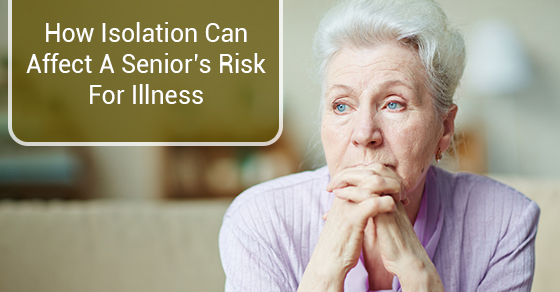When we are young, we are blessed with many friends and acquaintances. We are never at a loss for things to do or for opportunities to socialize. That changes as we age. Seniors slowly lose their friends, their spouse, and family members with the passing of time. This phenomenon is a serious problem, and can affect a senior’s risk of illness.

Anyone can feel isolated or alone at any age, but it presents a particular threat to the elderly. In fact, isolation and loneliness have consequences that can shorten the lifespan of a senior.
The Mental Consequences
When a senior is alone and socially isolated, they become anxious, stressed, and afraid. Cognitive abilities suffer as depression sets in, causing a lonely senior to isolate themselves further. They shy away from social interaction, and it can devolve into a downward spiral.
Doctors have known about this effect for some time, and a recent blog post discussed this at length.
A more recent discovery has been the risks seniors face for developing physical illness.
Physical Consequences
No one wants to admit they are lonely, and a senior caregiver would be best to first notice the signs of loneliness in the person who they are caring for. Doctors and researchers have discovered that isolation impairs the immune system, and in turn boosts inflammation. This makes an isolated senior more susceptible to infections and less likely to fight off illnesses. These health effects of loneliness and isolation occur gradually, and get faster as we age.
Chronic inflammation has many negative effects and can exacerbate the following illnesses:
- Arthritis
- Type 2 Diabetes
- Heart attack and stroke
- Obesity
- Alcoholism
- High blood pressure
- Cancer
Research has found these risks are more likely to occur in isolated individuals and are more likely to become fatal.
Some researchers believe that emotional isolation is rated as high as the risk of death from smoking. Others think the lonely get sicker than the non-lonely because they don’t have other people to take care of them.
The bottom line is that loneliness and isolation might actually be linked to a variety of physical ailments, as well as the mental ones.
Takeaways For The Caregiver
Since it is now accepted that isolation affects a senior’s risk for illness, make it a priority to find ways to fill the void.
Visit more often and encourage others to spend time with a lonely senior. Facilitate activities with others like watching movies, having lunch, and playing games. Maybe it’s time to transition them from living alone, to filling their days with positive social activities.
Be the ones who take care of lonely people. Seek help when you need it.
Contact C-Care Health Services for more information on our home care services.

